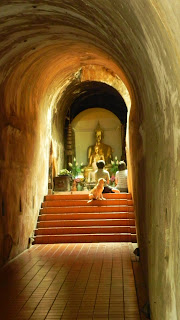The city of Chiang Mai is home to nearly 300 Wats (temples), all with their own unique character and beauty. I set off today to find a different kind of Wat, a forest Wat called ‘Wat Umong’. Though Wat Umong is nestled in the forest not far from Chiang Mai University, it feels like you are entering a whole new world. I had an instant feeling of calm and serenity as I started exploring the large complex. Since we are in the middle of the rainy season, the forest is painted with lush and vibrant shades of green, the air is moist, and the brick walls and walk ways are covered in moss. The way the sunlight shines through the canopy of trees added a certain magical feeling.
Wat Umong was built by King Mangrai, the first King of Chiang Mai, soon after he built the city of Chiang Mai around 1854 B.E. (Buddhist Era). It was built so that monks who had already studied the Buddha’s Teachings in the city could then seek peace and solitude in the forest in order to develop the practice of insight meditation.
There are three things that make Wat Umong extremely unique as far as temples are concerned. The first being the tunnels, built in the late 14th century, which give the Wat its name (“Umong” is the Thai word for tunnel). The tunnels criss-cross beneath a mound of earth and house many alcoves for lighting candles or placing offerings. Of course there are also many resident Buddha statues scattered throughout. The tunnels are dark and cool and smell of earth and incense. They are eerily quiet with faint remnants of the paintings that used to cover the walls and ceilings. It’s said that the tunnel walls were painted with bush scenes and arranged in the criss-crossed fashion to keep a famous but somewhat nutty monk within the tunnels as he had a history of wandering off into the forest.
 |
| Entrance to the caves |
 |
| Tunnel by the entrance |
 |
| Buddha statue at the end of a tunnel |
 |
| Two ladies and a dog listening to a Monk in the main part of the tunnels |
The second unique feature is a curious collection of various pieces of Buddha statues strewn about a mossy field area of the complex. The head of Buddha statue and the other sandstone pieces were made between 1400 & 1550 AD by craftsmen of Phayao School. They were collected between 1968 & 1970 from deserted monasteries in the Phayao province by Chao Chun Sirorasa and other faithful people of Wat Umong.
If you need a rest from exploring the complex you can have a seat on a bench by the lake or on the small island in the middle of the lake that is reached by a small foot bridge. Locals come here to feed the birds, fish, and turtles that call the lake and Wat Umong home and to soak up the innate tranquility. There are also Monks that live on the grounds.
Scattered around the complex are many trees that have been blessed and saved by the Monks through a robe ceremony. Some have signs with Buddhist exhortations written in Thai and some in English as well. You may also want to stop in the library, book store, or museum during your visit.
 |
| Robed trees |
 |
| Library |
Though there are many Wats in Thailand that are worth seeing, Wat Umong has made it into the top 5 on my list. So, if you ever find yourself in Chiang Mai and in need of some shade, peace, or an escape from the city, consider stopping by Wat Umong for a truly one of a kind experience.






Thanks for sharing this wonderful experience, Bethany. I'm glad you were able to visit a different kind of "wat"--quiet, serene, and removed from the town's hustle and bustle.
ReplyDeleteAjarn Rob
Hello Bethany! I really enjoy reading your blog. My name is Sage, and I attend CSU Chico as well. I will also be studying in Chiang Mai next year, and am very excited. If you could contact me that would be great because I have many questions to ask. Here is a link to my Facebook: https://www.facebook.com/caligrownsage
ReplyDelete